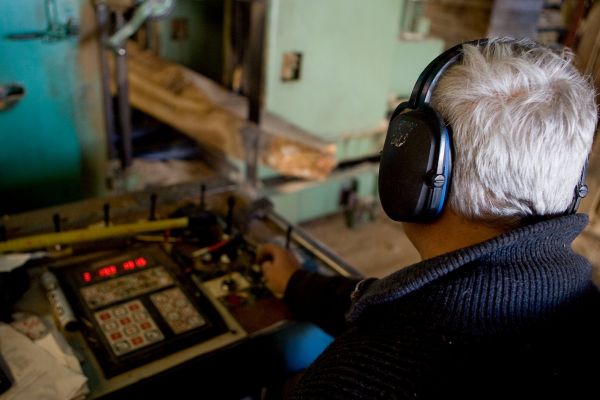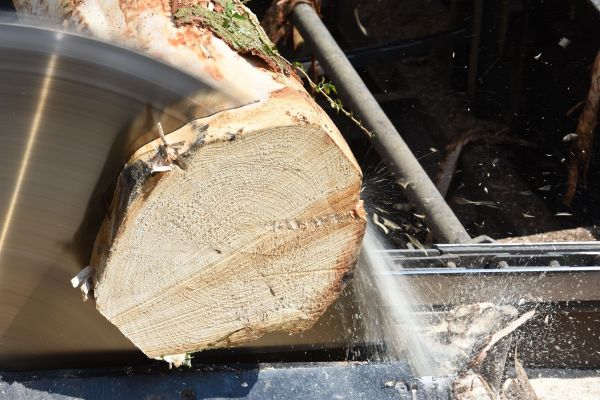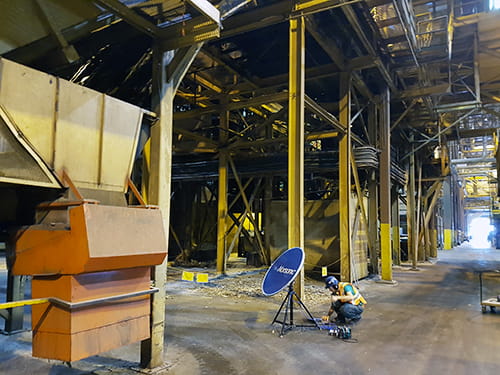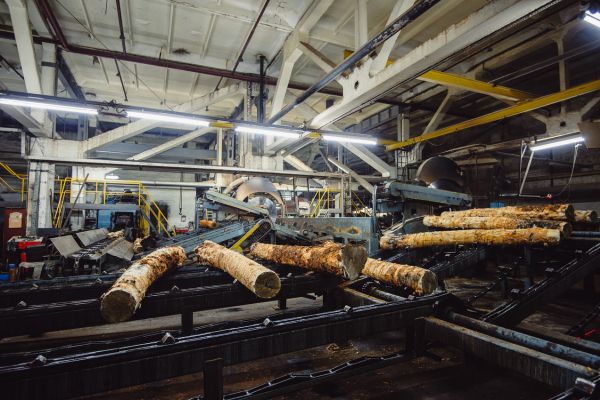Industrial Soundproofing for the Woodworking Industry: Why and How to Reduce Noise
Are the loud noises of sawmills disrupting your workplace and annoying your employees? If so, it's time to consider industrial noise control solutions. On this page, we'll look at the importance of noise reduction in woodworking industry and the different methods available to achieve effective industrial soundproofing.
Contact our industrial noise control expertsIndustrial Noise in Sawmills: What’s the Problem?
Sawmills are notorious for their constant high noise levels, which can not only lead to hearing loss, but also impact on employee productivity and well-being. By implementing industrial noise control techniques, you can create a quieter, more comfortable working environment. From the installation of acoustic panels to the use of vibration isolation systems, we're going to introduce you to various options that can significantly reduce noise levels in sawmills and woodworking industry.
Discover how industrial soundproofing can revolutionize your sawmill operations and improve the overall experience of your employees and the surrounding community.

The Importance of Industrial Noise Control in Woodworking Industry
Excessive noise in woodworking industry can have serious consequences for workers and the environment. One of the primary reasons why industrial soundproofing is essential in sawmills is to protect employees' hearing.
The high noise levels to which they are exposed on a daily basis can lead to permanent hearing loss. By reducing industrial noise, you can prevent these health problems and create a safer working environment.
Another crucial aspect of sawmill noise control is compliance with noise control regulations. Local authorities and safety organizations often require sawmills to comply with specific noise levels to protect the health and well-being of workers and nearby residents. Failure to comply with these rules can result in fines and penalties, as well as a bad reputation for your company.
Finally, soundproofing sawmills can also improve employee productivity and well-being. Excessive noise can cause fatigue, stress and concentration problems, all of which affect overall work efficiency. By creating a quieter environment, you promote employee concentration and comfort, which translates into greater productivity and job satisfaction.
The Harmful Effects of Excessive Sawmill Noise
Excessive noise in woodworking industry can have damaging effects on workers and the environment. Firstly, it can lead to permanent hearing loss in employees exposed to high noise levels for long periods. Hearing loss is often irreversible and can have a significant impact on people's quality of life. By reducing noise, you protect your employees' hearing health.
In addition to hearing loss, excessive noise can also cause stress, fatigue and concentration problems for workers. These effects can lead to reduced productivity and increased errors in the workplace. In addition, workers exposed to constant noise can experience sleep problems, which can impact on their general well-being.
Noise from sawmills can also disrupt the lives of residents and surrounding communities. High noise levels can cause nuisance and tension between sawmills and residents. By reducing noise in your sawmill, you can help create a better harmony between your company and the community.

In woodworking industry, noise levels are often very high, creating a difficult environment that requires increased protection for machine operators.
According to NIOSH recommendations, the maximum permissible noise exposure is 85 dBA per workstation, over an 8-hour period. However, the reality is quite different, as typical woodworking machines often generate much higher noise levels. These essential wood-cutting and shaping machines emit intrinsically high decibels, frequently exceeding 95 dBA where the operator is standing.
Clearly, the noise generated by the equipment and tools used in the woodworking industry causes a lot of noise. But we mustn't forget that sawmills also create a lot of dust, which has to be evacuated using dust collectors, for example. The latter further increases the noise exposure of machine operators.

Understand the Regulations Governing Noise Control in Sawmills
Before implementing noise control measures in your sawmill, it's essential to understand noise control regulations. Local authorities and safety organizations often have specific guidelines concerning acceptable noise levels in industrial areas.
It's important to comply with these regulations to avoid fines and penalties, as well as to ensure the safety and well-being of your employees and the surrounding community.
To ensure that your sawmill complies with regulations, it may be necessary to carry out an industrial acoustic survey and an environmental impact assessment. These measurements will give you a precise idea of your sawmill's current noise levels, and help you identify areas where soundproofing is required.
At Soft dB, our acoustic engineers have the know-how to target applied solutions to your industrial noise problems.
Assessment of Noise Sources in a Sawmill
Before choosing the best noise control solutions for your sawmill, it's important to understand the specific noise sources present in your working environment.
Sawmills can generate noise from a variety of machines and equipment, such as circular/line saws, debarkers, planers, dryers, conveyors, grinders and dust collectors. Each noise source requires a specific approach to industrial soundproofing.
A thorough assessment of noise sources using sound modeling can be carried out by acoustics experts, who will analyze the noise levels and frequencies emitted by each piece of equipment. This assessment will help you determine the most appropriate industrial soundproofing measures for your sawmill.

Industrial Soundproofing Solutions for Sawmills
There are several industrial soundproofing solutions available to reduce noise in sawmills. Here are some of the most commonly used options:
1. Machine enclosures: Noisy machines can be insulated to reduce noise propagation. Soundproof enclosures are designed to contain noise within the machine, reducing noise levels in the working environment.
2. Acoustic barriers: Acoustic barriers are structures designed to block noise. They can be installed around noisy areas of the sawmill to attenuate the propagation of sound to surrounding areas.
3. Use of vibration isolation systems: Vibrations generated by machines can also contribute to noise in sawmills. Vibration isolation systems help to reduce these vibrations and, consequently, the associated noise.
Soft dB acoustic blankets make a significant difference to the sound level radiated by the industrial equipment covered, by trapping noise directly at its source of emission. Based on an exclusive patented concept, our blankets are the only ones to offer the ease of installation provided by magnetic anchors.

The Benefits of Noise Control in Woodworking Industry for Workers and the Surrounding Community
Investing in industrial soundproofing for woodworking industry has many benefits for workers and the surrounding community. Firstly, it protects employees' hearing health, reducing the risk of permanent hearing loss. It also helps improve workers' general well-being by creating a quieter, more comfortable working environment.
What's more, soundproofing sawmills can improve relations with the surrounding community. By reducing noise levels, you mitigate the noise nuisance that can disturb nearby residents and living spaces. This promotes better cohabitation and harmony between your company and the community.
Last but not least, noise control in sawmills can contribute to greater productivity. By reducing noise, you improve concentration and communication between workers, which translates into increased efficiency and quality of work.

Investing in Woodworking Industry Noise Control Is Therefore a Decision That Pays off in the Long Term.
Contact Soft dB for personalized advice on the best soundproofing solutions for your sawmill. Take action now to create a more pleasant working environment that respects the health of your employees and the surrounding community.
Contact our industrial noise control experts